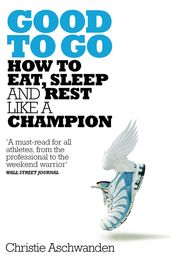Synopsis
'A must-read for all athletes, from the professional to the weekend warrior.'
Wall Street Journal
The NEW YORK TIMES BESTSELLING account of the new frontier of sports recovery science, which shows what we should and shouldn't be doing between exercising to achieve maximum performance.
All athletes, from Olympians to weekend warriors, must find the balance between training and recovery to maximize the benefits of workouts and reach optimal performance. For the longest time, coaches and training manuals have emphasized training above all else. However, science shows that recovery is a crucial component of exercise training and it may even be the most important one.
Good to Go is the first definitive account of this new frontier in sports and exercise science. Christie Ashwanden takes you on a first-person tour through the science of exercise recovery, from ice baths and cryogenic freezing chambers to the science behind Usain Bolt’s love of chicken nuggets and Tom Brady’s recovery pyjamas.
Full of eye-opening revelations, Aschwanden takes us on an invigorating journey through the science and potions of sports recovery and debunks the junk to give a clear picture of what we should actually be doing to achieve peak performance.
Details
Reviews
Christie Aschwanden is simply one of the best science writers in the world. Whether you’re striving for a personal best or simply wondering about that post-workout beer, Good to Go is the definitive tour through a bewildering jungle of scientific (and pseudo-scientific) claims that comprise a multi-billion dollar recovery industry.
Recovery is the great athletic obsession of our time. But how much do we really understand about it? Christie Aschwanden cuts through the hype to explore the topic with nuance, humor, and – most important – scientific rigor. The result is a much-needed reappraisal of how we should think about recovery, making Good to Go the most important book about training you’ll read this year.
This authoritative, delightful, and much-needed book slices through the hype around athletic recovery, and will surely cement Christie Aschwanden’s status as one of the world’s top science writers. Even if you’ve never run a race in your life, you’ll sprint through it. I laughed a lot, and learned even more.
'A fascinating, whirlwind investigation into recovery techniques. The book offers a useful introduction to how scientific research works - and why, in sports science, it often doesn’t. Such insights make Good to Go appealing to more than just gym rats and weekend warriors. It’s for anyone who wonders how scientific studies happen, and how they influence the claims on products found in grocery stores and athletic stores alike.'
